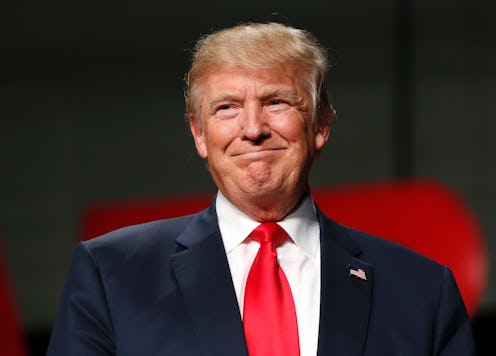News
Why Did Donald Trump Win?
Well, there you have it, folks. The 2016 presidential election has come to an end, and the outcome was decidedly not the one that Democrats, progressives, and anybody who cares about a stable and sustainable world wanted: according to the AP, Donald Trump will be the next president of the United States, despite looking like an overwhelming underdog just one week out from the election. So, the question surely on everyone's mind: why did Donald Trump win?
The answer, simply put, is that he closed the gap in the polls with Clinton sufficiently in the final week to claw back a pathway to 270 delegates, a pathway that ultimately opened up for him on election day. What this means is that Trump is now president-elect of the United States. As for how he actually pulled this off, it's probably a little too early to say ― there will surely be a lot of time, both immediately and for future historians, to parse exactly what transpired in the final month of the campaign, what factors tightened the polls (although it certainly seems like FBI director James Comey's unprecedented and controversial intervention played a role, this shouldn't simply be assumed), and how the country ultimately ended up, well, here.
As for what he overcame, however, it's simultaneously stunning given who he is, but also not, given the country's seemingly endless tolerance of him. Trump was elected president despite having no political experience, and no serious record whatsoever on any public policy ideas. He won despite having soundly demonstrated to have lost all three presidential debates, despite the insistence of his campaign (on the basis of junk online polls) that he actually won them.
He won even though he averaged about one statement every three days that would've been solidly disqualifying for literally any other candidate the country's ever known, displaying an open ignorance of basic facts essential to the operation of the U.S. government, and an authoritarian streak that should terrify any student of history.
He won by adopting a set of political positions, few if any of which he spoke about in enough detail to demonstrate he actually understood them, and almost none of which he'd displayed real commitment to in any other period of his high-profile life. He won with appeals to racism, misogyny, belligerence, and perhaps above all, cruelty and retribution. He won as likely the most popular candidate among white nationalists and anti-Semites in a generation. He won by demonizing Muslims and his non-white critics to the point of incitement, and by corrupting absolutely everyone ― from the people in his inner circle, to the people who ultimately voted for him ― through his mere proximity to them, somehow making each and every person exposed to him worse than they were before.
And, of course, he won despite being hit by more than a dozen allegations of sexual harassment and assault in the closing month of the campaign, allegations corroborated by Trump's own hot mic boasts from 2005. For the record, both Trump and his campaign have vehemently denied these allegations, with the man himself publicly calling his other accusers "horrible liars." Apparently, enough of the voters either agreed with him, weren't sure, or didn't care one way of the other.
Suffice to say, this is not a happy or reassuring day for tens of millions of Americans, especially those who Trump's been so hard on ― undocumented immigrants, Muslims, and potential Syrian refugees, to name a few. But it's impossible to escape the conclusion that when it was all said and done, enough people were either ignorant of the America he's proposing to create, or felt some genuine affection at the idea. Trump will be inaugurated on Friday, January 20th, 2017.
